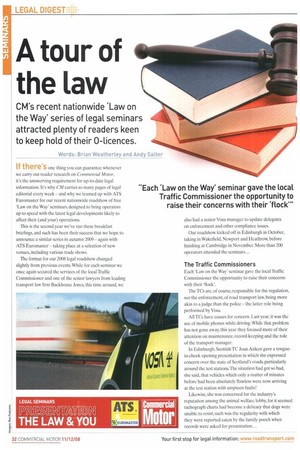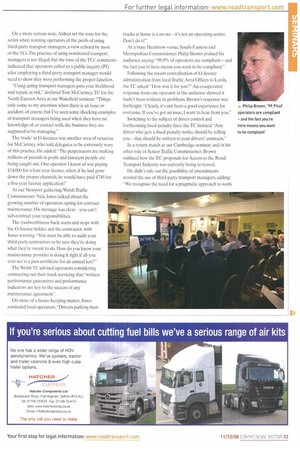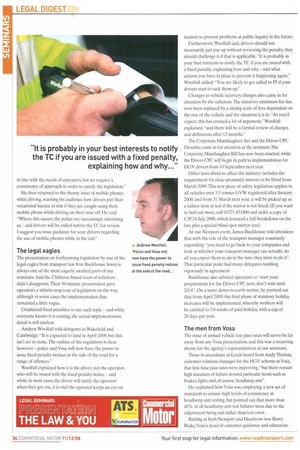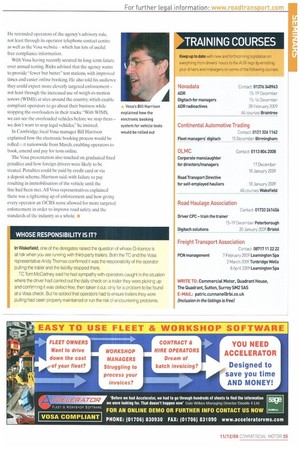A tour of the Law
Page 32

Page 33

Page 34

Page 35

If you've noticed an error in this article please click here to report it so we can fix it.
CM's recent nationwide 'Law on the Way' series of legal seminars attracted plenty of readers keen to keep hold of their 0-licences.
Words: Brian Weatheriey and Andy Satter
Ifthere's one thing you can guarantee whenever we carry out reader research on Commercial Motor, its the unswerving requirement for up-to-date legal information. It's why CM carries so many pages of legal editorial every week — and why we teamed up with ATS Euromaster for our recent nationwide roadshow of free 'Law on the Way seminars, designed to bring operators up to speed with the latest legal developments likely to affect their (and your) operations.
This is the second year we've run these breakfast briefings, and such has been their success that we hope to announce a similar series in autumn 2009 — again with ATS Euromaster — taking place at a selection of new venues, including various trade shows.
The format for our 2005 legal roadshow changed slightly from previous events. While for each seminar we once again secured the services of the local Traffic Commissioner and one of the senior lawyers from leading transport law tint Backhouse Jones, this time around, we also had a senior Vosa manager to update delegates on enforcement and other compliance issues.
Our roadshow kicked off in Edinburgh in October, taking in Wakefield, Newport and Heathrow, before finishing at Cambridge in November. More than 200 operators attended the seminars...
The Traffic Commissioners Each 'Law on the Way' seminar gave the local Traffic Commissioner the opportunity to raise their concerns with their 'flock'.
The TO are, of course, responsible for the regulation, not the enforcement, of road transport law, being more akin to a judge than the police — the latter role being performed by Vosa.
All TCs have causes for concern. Last year, it was the use of mobile phones while driving. While that problem has not gone away, this year they focused more of their attention on maintenance, record-keeping and the role of the transport manager.
In Edinburgh, Scottish TC Joan Aitken gave a tonguein-cheek opening presentation in which she expressed concern over the state of Scotland's roads, particularly around the test stations, The situation had got so bad, she said, that vehicles which only a matter of minutes before had been absolutely flawless were now arriving at the test station with umpteen faults!
Likewise, she was concerned for the industry's reputation among the animal welfare lobby, for it seemed tachograph charts had become a delicacy that dogs were unable to resist, such was the regularity with which they were reported eaten by the family pooch when records were asked for presentation... On a more serious note. Aitken set the tone for the series when warning operators of the perils of using third-party transport managers, a view echoed by most of the "Its. The practice of using nominated transport managers is not illegal, hut the tone of the TCs comments indicated that operators called to a public inquiry (PI) after employing a third-party transport manager would need to show they were performing the proper function.
"Using acting transport managers puts your livelihood and repute at risk," declared Torn McCartney,TC for the North-Eastern Area at our Wakefield seminar. "Things only come to my attention when there is an issue or accident, of course, but I've seen some shocking examples of transport managers being used when they have no knowledge of, or contact with, the business they are supposed to be managing.
The 'trade' in 0-licences was another area of vexation for McCartney. who told delegates to be extremely wary of this practice. He added: "The perpetrators are making millions of pounds in profit and innocent people are being caught out. One operator 1 know of was paying £14,000 for a four-year licence, when, if he had gone down the proper channels, he would have paid £745 for a five-year licence application!"
At our Newport gathering. Welsh Traffic Commissioner Nick Jones talked about the growing number of operators opting for contract maintenance. His message was clear you can't sub-contract your responsibilities.
The roadworthiness buck starts and stops with the 0-licence holder. not the contractor, with Jones warning: "You must be able to audit your third-party contractors to be sure they're doing what they're meant to do. How do you know your maintenance provider is doing it right if all you ever see is a pass certificate for an annual test?"
The Welsh TC advised operators considering contracting out their truck servicing that "written performance guarantees and performance indicators are key to the success of any maintenance agreement".
On more of a house-keeping matter, Jones reminded local operators: -Drivers parking their trucks at home is a no-no it's not an operating centre. Don't do it!"
At a busy Heathrow venue, South-Eastern and Metropolitan Commissioner Philip Brown praised his audience, saying: "99.9% of operators are compliant and the fact you're here means you want to be compliant."
Following the recent centralisation of 0-licence administration from local Traffic Area Offices to Leeds, the TC asked: "How was it for you?" An exasperated response from one operator in the audience showed it hadn't been without its problems. Brown's response was forthright: "Clearly, it's not been a good experience for everyone. If you've got an issue, I want to hear from you."
Switching to the subject of driver control and forthcoming fixed-penalty fines, the TC insisted: "Any driver who gets a fixed-penalty notice should be telling you that should be written in your drivers' contracts."
In a return match at our Cambridge seminar, and in his other role of Senior Traffic Commissioner, Brown outlined how the EC proposals for Access to the Road Transport Industry was currently being reviewed.
He didn't rule out the possibility of amendments around the use of third-party transport managers, adding: "We recognise the need for a pragmatic approach to work in line with the needs of operators, but we require a consistency of approach in order to satisfy the legislation."
He then returned to the thorny issue of mobile phones while driving, warning his audience how drivers put their vocational licence at risk if they are caught using their mobile phone while driving on their time off. He said: "Where this occurs, the police are increasingly informing us and drivers will be called before the TC for review. I suggest you issue guidance for your drivers regarding the use of mobile phones while in the cab."
The legal eagles 'Police and Vosa wilt The presentation on forthcoming legislation by one of the now have the power to legal eagles from transport law firm Backhouse Jones is issue fixed penalty notices always one of the most eagerly awaited parts of our at the side of the road...'
seminars. And the Clitheroe-based team of solicitors didn't disappoint. Their 30-minute presentation gave operators a whistle-stop tour of legislation on the way, although in some cases the implementation date remained a little vague.
Graduated fixed penalties is one such topic and while everyone knows it is coming, the actual implementation detail is still unclear.
Andrew Woolfall told delegates in Wakefield and Cambridge: "It is expected to land in April 2009. but this isn't set in stone. The outline of the regulation is clear, however police and Vosa will now have the power to issue fixed-penalty notices at the side of the road for a range of offences" Woolfall explained how it is the driver, not the operator, who will be issued with the fixed-penalty notice and while, in most cases, the driver will notify the operator when they get one, it is vital the operator keeps an eye on matters to prevent problems at public inquiry in the future.
Furthermore, Woolfall said, drivers should not necessarily just pay up without reviewing the penalty, they should challenge it if that is applicable. "It is probably in your best interests to notify the TC if you are issued with a fixed penalty, explaining how and why and what actions you have in place to prevent it happening again," Woolfall added. -You are likely to get called to PI if your drivers start to rack them up."
Changes to vehicle recovery charges also came in for attention by the solicitors. The statutory minimum fee has now been replaced by a sliding scale of fees dependant on the size of the vehicle and the situation it is in. "As you'd expect, this has created a lot of argument," Woolfall explained, "and there will be a formal review of charges and definitions after 12 months."
The Corporate Manslaughter Act and the Driver CPC Directive came in for attention at the seminars. The Corporate Manslaughter Bill has now been enacted, while the Driver CPC will begin its path to implementation for HGV drivers from 10 September next year.
Other laws about to affect the industry includes the requirement for close-proximity mirrors to be fitted from March 2009. This new piece of safety legislation applies to all vehicles over 3.5 tonnes GVW registered after January 2000. and from 31 March next year, it will be picked up as a failure item at test if the mirror is not fitted. (If you want to find out more, call 01371 851800 and order a copy of CM 24 July 2008, which featured a full breakdown on the law, plus a special blind-spot mirror test).
At our Newport event, James Backhouse told attendees that with the role of the transport manager constantly expanding, "you need to go back to your companies and look at whether your transport manager can actually do all you expect them to do in the time they have to do it". That particular point had many delegates nodding vigorously in agreement.
Backhouse also advised operators to "start your preparations for the Driver CPC now don't wait until 2014". On a more down-to-earth matter, he pointed out that from April 20G9, the final phase of statutory holiday increases will be implemented, whereby workers will be entitled to 5.6 weeks of paid holiday, with a cap of 28 days per year.
The men from Vasa
The issue of annual vehicle test pass rates will never be far away from any Vosa presentation, and this was a recurring theme for the agency's representatives at our seminars.
Those in attendance at Leeds heard from Andy Thomas, customer relations manager for the HGV scheme at Vosa, that first-time pass rates were improving, "hut there remain high instances of failure around particular items such as brakes, lights and, of course, headlamp aim".
He explained how Vasa was employing a new set of standards to ensure high levels of consistency in headlamp aim testing, but pointed out that more than 40% of all headlamp aim test failures were due to the adjustment being out rather than test error.
Batting at both Newport and Heathrow was Barry Ricks, Vosa's head of customer guidance and education. He reminded operators of the agency's advisory role, not least through its operator telephone contact centre as well as the Vosa website — which has lots of useful free compliance information, With Vosa having recently secured its long-term future over annual testing, Ricks advised that the agency wants to provide "fewer hut better" test stations, with improved times and easier online booking. He also told his audience they could expect more cleverly targeted enforcement not least through the increased use of weigh-in-motion senors (WIMS) at sites around the country, which enable compliant operators to go about their business while stopping the overloaders in their tracks. "With WIMS, we can see the overloaded vehicles before we stop them — we don't want to stop legal vehicles," he insisted.
In Cambridge. local Vasa manager Bill Harrison explained how the electronic booking process would be rolled nationwide from March, enabling operators to book, amend and pay for tests online.
The Vosa presentation also touched on graduated fixed penalties and how foreign drivers were likely to be treated. Penalties could he paid by credit card or via a deposit scheme, Harrison said, with failure to pay resulting in immobilisation of the vehicle until the fine had been met. All Vosa representatives explained there was a tightening up of enforcement and how giving every operator an OCRS score allowed for more targeted enforcement in order to improve road safety and the standards of the industry as a whole. im




























































































































































